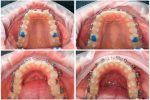Patients can often feel stressed when undergoing dental surgery, especially when they are not sure of the type of anesthesia they will receive. From routine simple extractions to complex implant surgery, knowing your anesthesia options will alleviate some anxiety and make the experience more pleasant. In this article, we will discuss dental surgery in Victoria, types of anesthesia, and what to expect during and after your surgery.
Types of Anesthesia in Dental Surgery
There are two kinds of anesthesia commonly employed by dentists based on the difficulty of the treatment and the requirements of the patient:
1. Local Anesthesia
Local anesthesia dental surgery numbs a given area only. You are still the same, and you will not experience pain in the process. The local anesthesia is usually applied in:
- Minor tooth extractions
- Root canal treatments
- Easy fillings and restorations.
- Cases by way of a single dental implant.
Advantages:
- Quick recovery
- Minimal side effects
- The patient is alert and conscious.
2. General Anesthesia
In more complicated dental operations, e.g., multiple tooth extraction or extensive implant surgeries, the use of general anesthesia may be advised. This type of anesthesia makes the patient fully unconscious, and the dentist is able to carry out elaborate operations with no stress and discomfort to the patient.
Common uses include:
- Tooth extractions of more than one affected tooth.
- High-tech dental implantation.
- Patient severe dental anxiety procedures.
Advantages:
- It will be a pain-free experience.
- Helps anxious patients to be less stressed.
- Facilitates a lot of dental work at the same session.
Factors That Influence Anesthesia Choice
There are a number of considerations that decide which type of anesthesia is better between local anesthesia dental surgery and general anesthesia:
- Complexity of the procedure: Minor surgical operations may need local anesthesia, whereas major surgical operations may need general anesthesia.
- Discomfort in patients and anxiety levels: High anxiety or dental phobia can result in the use of general anesthesia.
- Medical history: Pre-existing health conditions and drugs contribute to the choice of anesthesia.
- Teeth or procedures: Several procedures during one session may be enhancing the use of general anesthesia.
Your dentist in Victoria will examine your medical history, acknowledge opportunities, and assist you in making a wise choice that would guarantee a safe and comfortable one.
Recovery After Anesthesia
The time to get back on track will be determined by the anesthesia employed:
Local anesthesia:
- Numbness may last a few hours
- Minimal downtime
- Able to resume the normal activities on the same day.
General anesthesia:
- May cause grogginess for several hours
- Needs somebody to take you home.
- The instructions regarding the postoperative care should be adhered to.
Safety Considerations
Safety is the order of the day among dentists when performing dental surgery. Steps include:
- Investigating your full medical history.
- Evaluating allergies or drug interactions.
- Assessment of vital signs during the procedure.
- Giving elaborate postoperative guidelines.
Local anesthesia dental surgery and general anesthesia are safe provided that they are conducted by a trained dentist.
Find Us on Google Map
Conclusion
It is better to be aware of your anesthesia choices so that you look forward to dental surgery. You are either requiring a small operation or a complicated dental practice; knowing the difference between local and general anesthesia is one way to guarantee a relaxing and painless experience.
To experience dental surgery without any stress, call Oak Bay Dental Clinic and schedule an appointment. Our professional team will help you in all the steps, with the care of your comfort in mind.








